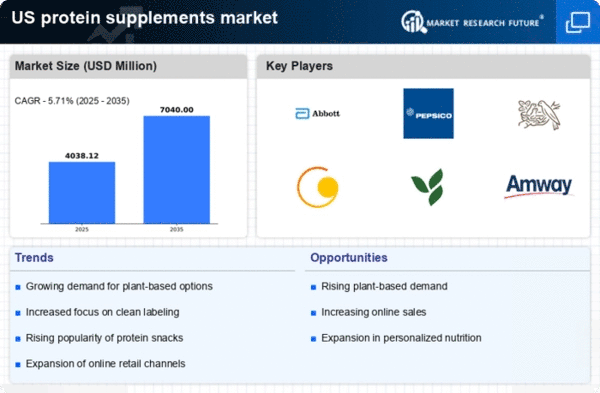Growing Health Consciousness
The increasing awareness of health and wellness among consumers is a primary driver of the protein supplements market. As individuals become more conscious of their dietary choices, they actively seek out products that can enhance their nutritional intake. This trend is particularly evident in the rising demand for protein supplements, which are perceived as essential for muscle recovery, weight management, and overall health. According to recent data, the protein supplements market is projected to grow at a CAGR of approximately 8% over the next five years, indicating a robust interest in these products. The focus on health and fitness is likely to continue influencing consumer behavior, thereby propelling the growth of the protein supplements market.
Expansion of E-commerce Platforms
The rapid growth of e-commerce platforms has transformed the way consumers access protein supplements. With the convenience of online shopping, consumers can easily compare products, read reviews, and make informed purchasing decisions. This shift towards digital retailing has led to a significant increase in sales within the protein supplements market. Data shows that online sales of protein supplements have surged by over 30% in the past year alone, reflecting a broader trend towards e-commerce in the health and wellness sector. The protein supplements market is likely to continue benefiting from this trend, as more consumers prefer the convenience and variety offered by online retailers.
Innovations in Product Formulation
Innovations in product formulation are driving the evolution of the protein supplements market. Manufacturers are increasingly focusing on developing unique blends and formulations that cater to diverse dietary preferences and restrictions. For instance, the introduction of protein supplements that are free from allergens or enriched with additional nutrients is becoming more common. This trend not only attracts a broader consumer base but also enhances the overall appeal of protein supplements. The protein supplements market is witnessing a shift towards more specialized products, which may lead to increased market penetration and consumer loyalty as individuals seek tailored solutions for their nutritional needs.
Rising Demand for Sports Nutrition
The growing interest in sports nutrition is a significant driver of the protein supplements market. Athletes and fitness enthusiasts are increasingly turning to protein supplements to optimize their performance and recovery. This trend is supported by a rising number of sports events and competitions, which further fuels the demand for specialized nutrition products. Recent market analysis indicates that the sports nutrition segment within the protein supplements market is expected to grow by approximately 10% annually. This growth suggests that the protein supplements market is well-positioned to capitalize on the increasing focus on performance-enhancing nutrition among active individuals.
Increased Participation in Fitness Activities
The surge in fitness activities, including gym memberships and home workouts, has significantly impacted the protein supplements market. As more individuals engage in regular exercise, the demand for protein supplements has escalated, as these products are often associated with muscle building and recovery. Recent statistics indicate that nearly 60% of gym-goers utilize protein supplements to support their fitness goals. This trend is expected to persist, with the protein supplements market benefiting from the growing fitness culture. The integration of protein supplements into post-workout routines is becoming increasingly common, suggesting that the market will continue to thrive as fitness enthusiasts seek effective ways to enhance their performance.
















